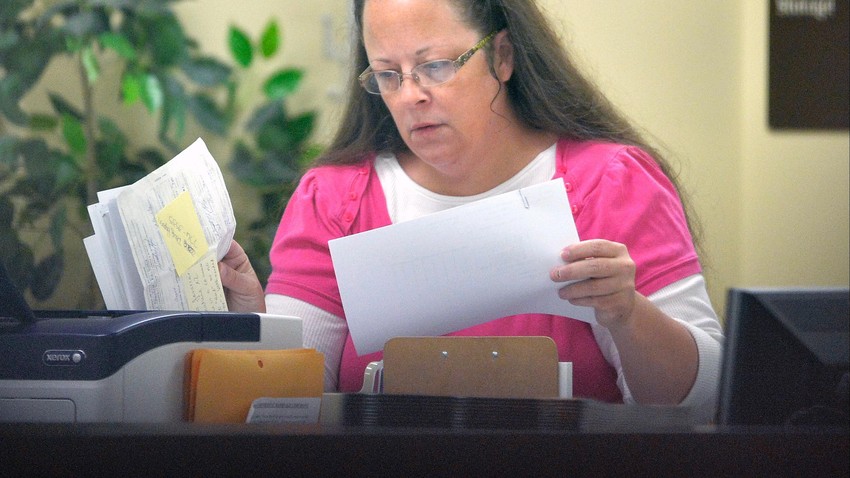
THE DEFIANT KENTUCKY CLERK
So is she a hero or a villain? Rowan County (Kentucky) clerk Kim Davis was welcomed by adulating throngs this Tuesday, when U.S. District Court Judge David Bunning, who had incarcerated her last week for contempt of court, released her from jail. At issue is Ms. Davis’ contention that as an Apostolic Christian her conscience forbids her from complying with the Supreme Court’s summer decision declaring same sex marriages legal across this nation. Citing her understanding of biblical injunctions against same sex sexual relations, the Rowan County clerk refused to issue marriage licenses to same sex couples applying for the Supreme Court mandated provision.
So if you were the county clerk, how would you have responded to that dilemma, caught between the highest court in the land’s ruling and a growing que of applicants for same sex marriage licenses?
The issue isn’t so neatly resolved, is it? On the one hand the Bible commands Christians: “Let everyone be subject to the governing authorities, for there is no authority except that which God has established. The authorities that exist have been established by God” (Romans 13:1). That seems clear enough. For this fallen planet, God has ordained governmental authority and civil power to preserve a semblance of law and order for the human race. “Therefore, it is necessary to submit to the authorities, not only because of possible punishment but also as a matter of conscience” (v 5).
But of course, “conscience” was and remains the rub. Simply because Ms. Davis cited her conscience as reason for disobeying the court order to issue marriage licenses to same sex couples. The same Bible that commands obedience to governing authorities also declares: “‘We must obey God rather than man’” (Acts 5:29). Those were Peter’s words to the Sanhedrin when he and his fellow apostles were charged not to publicly teach “in this name” of Jesus (v 28). Clearly there are instances when governmental authority is overruled (at least in the divine tribunal) by conscientious loyalty to one’s understanding of God’s Word and His will. Furthermore, even if you have misunderstood a biblical position, you are still enjoined by Scripture to be obedient to your conscience, “for whatever is not from faith [i.e., whatever violates what the conscience believes is right] is sin” (Romans 14:23). Simply put—it is dangerous to disobey your conscience, for through the conscience the Creator communicates with His sentient earth children.
Thus Kim Davis made the decision to honor her conscientious objection to the law of the land and refused to sign the same sex marriage applications. For her act of civil disobedience she was subsequently jailed. Again, what would you have done? Is there a proscribed Christian pathway through the minefield that our national debate over same sex marriage is taking us? What would Jesus do?
On October 3, as a final piece in our mini-series “The Pugwash Factor,” we will grapple with culture, conscience and Scripture in “How to Respond to the Supreme Court’s Same Sex Marriage Decision.” But we must not expect a neat and tidy resolution to the dilemma. Yes, obedience to conscience is in the end a simple matter—just do it—simply obey. But it is hard work to seek an informed conscience that intelligently discerns the issues swirling at Scripture's intersection with our third millennial complexity. Fortunately Christ will guide His followers. What remains for us then is to “take up [your] cross daily and follow Me” (Luke 9:23).